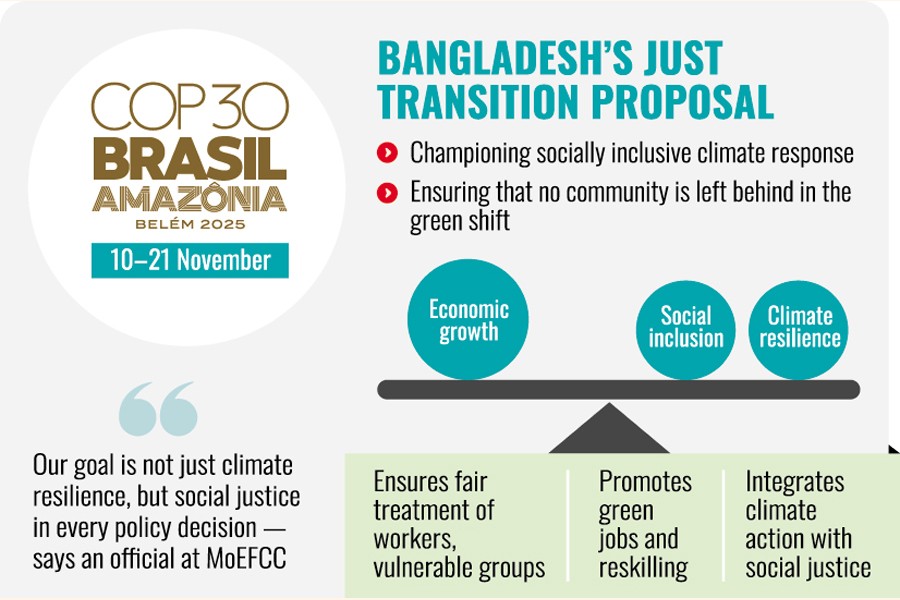COP30 SUMMIT IN BRAZIL: Bangladesh to present 'Just Transition' agenda

Published :
Updated :

For the first time, Bangladesh will introduce the concept of a 'Just Transition', a framework that integrates climate-affected communities into decent employment, at the upcoming COP30 summit in Belém, Brazil, on November 10-21.
The move signals a shift in Bangladesh's climate strategy towards a more socially inclusive and equitable transition to a low-carbon economy.
Officials say the aim is to ensure that sustainability and social inclusion go hand in hand, helping those most impacted by climate change adapt to greener livelihoods while safeguarding their economic security.
The Just Transition framework ensures that workers and communities affected by the shift to a low-carbon economy are not left behind.
Originating in the United States in the 1980s, it is widely attributed to oil and atomic workers' leader Tony Mazzocchi, who advocated for policies to protect jobs during industrial change.
The concept gained global recognition when the 2015 Paris Agreement emphasised "decent work and quality jobs" for those affected by climate transitions.
The approach prioritises equitable access to green jobs, retraining, and social safety nets for people displaced by climate-related disruptions - from agricultural losses to the decline of carbon-intensive industries.
"We will place our first-ever commitment on the Just Transition at the global meeting in Belém," said Navid Shafiullah, Additional Secretary at the Ministry of Environment, Forest and Climate Change.
"The goal is to ensure that no one is left behind as Bangladesh adapts and transitions to sustainable practices."
He noted that Bangladesh's climate focus at previous COP summits has centred mainly on mitigation and adaptation, but the Just Transition framework will add a new social dimension.
Effective implementation, he said, will depend on clear policy frameworks, inter-ministerial coordination, and adequate international funding.
As one of the world's most climate-vulnerable nations, Bangladesh faces rising sea levels, salinity intrusion, extreme heat, and erratic weather patterns.
These challenges are already displacing millions, and threatening livelihoods in coastal, agricultural, and informal sectors.
Beyond economic damages, climate impacts are also causing non-economic loss and damage (NELD), including deteriorating physical and mental health.
Experts believe the initiative marks an important evolution in Bangladesh's climate leadership.
"We need funds to re-employ workers who have lost jobs due to the phase-out of traditional industries or production shifts," said Dr Fazle Rabbi Sadeque Ahmed, a climate change specialist.
"Discussions are ongoing, but Bangladesh must mobilise its own resources to make this mechanism work."
The environment ministry is now collaborating with development partners and research institutions to identify priority sectors, including energy, transport, textiles, and agriculture, for the transition.
Several developed countries, particularly in the European Union, have already adopted Just Transition policies to protect workers as industries decarbonise.
Bangladesh's decision to formally present the agenda at COP30 marks a new chapter in its climate diplomacy, seeking global cooperation, technology transfer, and financial support to ensure its green transformation is both fair and inclusive.
jasimharoon@yahoo.com


 For all latest news, follow The Financial Express Google News channel.
For all latest news, follow The Financial Express Google News channel.